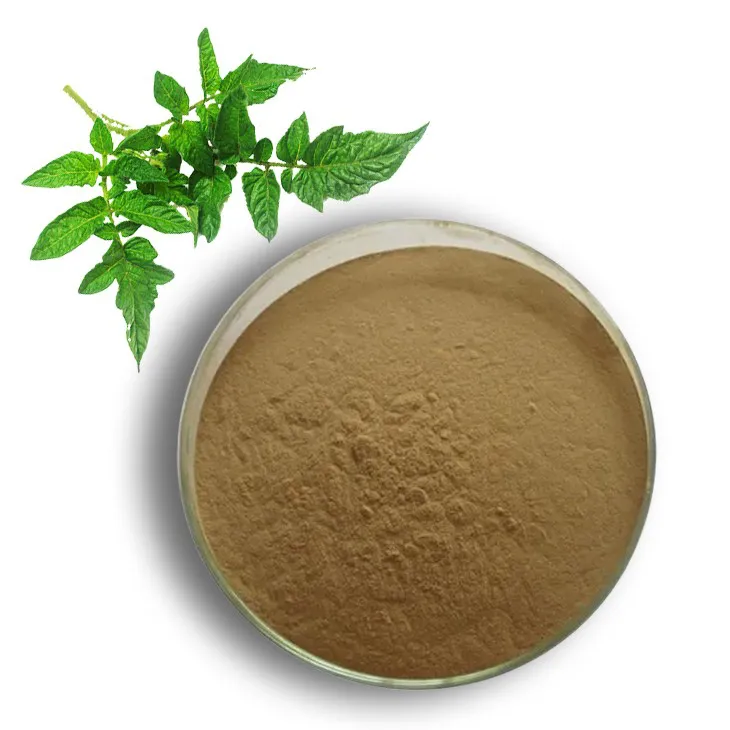- 0086-571-85302990
- sales@greenskybio.com
Senna Leaf Extract: Benefits, Uses and Possible Side Effects
2024-11-14

1. Introduction
Senna Leaf Extract is a substance derived from the senna leaves. It has been recognized for its various medicinal properties and has been used in different medical and health - related applications for a long time. The extract contains active compounds that interact with the body's digestive system, particularly the intestines, leading to a range of effects that can be both beneficial and potentially harmful if not used properly.

2. The Composition of Senna Leaf Extract
Senna Leaf Extract is rich in several bioactive compounds. Anthraquinones are the most important ones. These compounds are responsible for the laxative effect of the extract. They stimulate the colonic mucosa, which in turn enhances peristalsis, the rhythmic contractions of the intestines that move the stool forward. Other components in the extract also contribute to its overall activity, although the anthraquinones are the main drivers of its physiological effects on the digestive system.

3. Benefits of Senna Leaf Extract
3.1 Relief from Constipation
One of the primary benefits of senna leaf extract is its effectiveness in relieving constipation. In modern society, constipation is a common problem due to factors such as a sedentary lifestyle, a diet low in fiber, and stress. Senna leaf extract works by increasing the motility of the intestines. It stimulates the smooth muscles in the intestinal walls to contract more vigorously, which helps to move the fecal matter through the colon more quickly. This results in a more regular bowel movement pattern, providing relief to those suffering from constipation.
3.2 Preparation for Medical Procedures
In some medical situations, such as before certain surgeries or diagnostic procedures involving the colon, it is necessary to have a clean colon. Senna leaf extract can be used to empty the colon effectively. It helps to clear out any remaining fecal matter, reducing the risk of complications during the medical procedure. For example, in colonoscopy, a clean colon is essential for accurate visualization of the colon lining, and senna - based preparations are often used to achieve this.
3.3 Traditional Medicine Applications
- Senna leaf extract has a long history of use in traditional medicine systems around the world. In Ayurvedic medicine, it has been used for centuries to treat various digestive disorders. Ayurvedic practitioners believe that it can help balance the body's "doshas" related to digestion.
- In traditional Chinese medicine, senna has also been used in herbal formulations for similar purposes. It is often combined with other herbs to enhance its effects while minimizing potential side effects. These traditional uses suggest that there may be broader benefits of senna leaf extract beyond its well - known laxative properties.

4. Uses of Senna Leaf Extract
4.1 Over - the - Counter Laxative Products
Senna leaf extract is a common ingredient in many over - the - counter (OTC) laxative products. These products are easily accessible to consumers who are experiencing occasional constipation. They come in various forms, such as tablets, capsules, and liquid preparations. The dosage and instructions for use are usually clearly marked on the packaging, making it relatively easy for users to self - administer the extract for short - term relief of constipation.
4.2 Herbal Remedies and Supplements
- As a part of herbal remedies, senna leaf extract may be combined with other herbs to create formulations that target digestive health. For example, it may be paired with herbs like fennel or peppermint, which have carminative properties (help to relieve gas and bloating), to provide a more comprehensive solution for digestive discomfort.
- In the supplement market, senna - based products are also available. These supplements are often marketed towards individuals looking to improve their bowel regularity or those who are interested in natural alternatives to conventional laxatives. However, it is important to note that the quality and safety of these supplements can vary, and consumers should be cautious when choosing such products.
5. Possible Side Effects of Senna Leaf Extract
5.1 Gastrointestinal Disturbances
- The most common side effects of senna leaf extract are related to the gastrointestinal tract. Abdominal pain can occur, especially if the extract is taken in excessive amounts or if the individual has a sensitive digestive system. The increased peristalsis can cause cramping and discomfort in the abdomen.
- Diarrhea is another potential side effect. When the intestines are over - stimulated by the senna leaf extract, it can lead to loose stools and, in severe cases, diarrhea. Prolonged or excessive diarrhea can cause dehydration and electrolyte imbalances, which can be dangerous if not addressed promptly.
5.2 Dependency and Rebound Constipation
- Long - term use of senna leaf extract can lead to a dependency on the laxative effect. The intestines may become accustomed to the external stimulation provided by the extract and lose their natural ability to contract and move stool on their own. This can result in a situation where the individual needs to continue using the extract to have a bowel movement.
- Rebound constipation can also occur when discontinuing the use of senna leaf extract after long - term use. The intestines may take some time to regain their normal function, and during this period, constipation can return, sometimes even more severely than before starting the extract.
5.3 Interaction with Medications
Senna leaf extract may interact with certain medications. For example, it can interfere with the absorption of some drugs in the intestines. This is because the increased motility of the intestines caused by the extract can reduce the time available for drug absorption. Medications that are particularly affected may include those with a narrow therapeutic index, such as some anti - arrhythmic drugs or drugs used for blood thinning. It is crucial for patients taking medications to consult their healthcare provider before using senna leaf extract to avoid potential drug interactions.
6. Precautions and Considerations
- When using senna leaf extract, it is important to follow the recommended dosage. Taking more than the recommended amount can increase the risk of side effects. The appropriate dosage may vary depending on factors such as age, overall health, and the severity of constipation.
- It is not suitable for long - term use without medical supervision. As mentioned earlier, long - term use can lead to dependency and other problems. If constipation persists for a long time, it is advisable to seek medical advice rather than relying solely on senna leaf extract.
- Pregnant and breastfeeding women should avoid using senna leaf extract. There is not enough evidence to confirm its safety during pregnancy and lactation, and the potential risks to the fetus or the nursing infant are unknown.
- People with certain underlying medical conditions, such as inflammatory bowel disease, intestinal obstruction, or severe abdominal pain of unknown origin, should not use senna leaf extract. In these cases, the use of the extract can exacerbate the existing condition or cause further complications.
7. Conclusion
Senna leaf extract offers significant benefits in terms of relieving constipation and has applications in traditional medicine as well as in modern medical procedures. However, it also comes with potential side effects that cannot be ignored. When using senna leaf extract, it is essential to be aware of these benefits and risks, follow the appropriate precautions, and, if in doubt, consult a healthcare professional. By doing so, individuals can make more informed decisions about whether and how to use this natural but potentially powerful substance for their digestive health.
FAQ:
What is Senna Leaf Extract?
Senna Leaf Extract is a substance derived from senna leaves. It has several medicinal properties and is mainly used to relieve constipation by stimulating intestinal peristalsis to promote defecation.
What are the main benefits of Senna Leaf Extract?
The main benefit of Senna Leaf Extract is that it can quickly and effectively improve intestinal function. It has been widely used in traditional medicine as well.
What are the possible side effects of Senna Leaf Extract?
Some possible side effects of Senna Leaf Extract include abdominal pain and excessive diarrhea. So, it should be used with caution.
How does Senna Leaf Extract relieve constipation?
Senna Leaf Extract relieves constipation by stimulating the movement of the intestines (intestinal peristalsis), which helps in the passage of stools.
Is it safe to use Senna Leaf Extract?
While Senna Leaf Extract can be effective in treating constipation, it is not without risks due to its possible side effects. It should be used under proper medical guidance, especially for long - term or excessive use.
Related literature
- The Pharmacological Properties of Senna Leaf Extract"
- "Senna Leaf Extract in Traditional and Modern Medicine"
- "A Comprehensive Review on the Benefits and Risks of Senna Leaf Extract"
- ▶ Hesperidin
- ▶ citrus bioflavonoids
- ▶ plant extract
- ▶ lycopene
- ▶ Diosmin
- ▶ Grape seed extract
- ▶ Sea buckthorn Juice Powder
- ▶ Beetroot powder
- ▶ Hops Extract
- ▶ Artichoke Extract
- ▶ Reishi mushroom extract
- ▶ Astaxanthin
- ▶ Green Tea Extract
- ▶ Curcumin Extract
- ▶ Horse Chestnut Extract
- ▶ Other Problems
- ▶ Boswellia Serrata Extract
- ▶ Resveratrol Extract
- ▶ Marigold Extract
- ▶ Grape Leaf Extract
- ▶ blog3
-
High purity olive leaf extract
2024-11-14
-
Lavender oil extraction method
2024-11-14
-
100% organic virgin sea buckthorn fruit oil
2024-11-14
-
Lotus leaf extract powder factory in China
2024-11-14
-
China aged garlic extract supplier
2024-11-14
-
Deer antler extract powder manufacturer
2024-11-14
-
Saw palmetto extract vs whole herb
2024-11-14
-
Quercetin
2024-11-14
-
Black Garlic Extract
2024-11-14
-
Boswellia Serrata Extract
2024-11-14
-
Avocado Extract Powder
2024-11-14
-
Lemon Juice Powder
2024-11-14
-
Curcuma Longa Extract/Turmeric extract
2024-11-14
-
Hawthorn Extract
2024-11-14
-
Hesperidin
2024-11-14
-
Reishi mushroom extract
2024-11-14
-
Lemon Balm Extract
2024-11-14





















